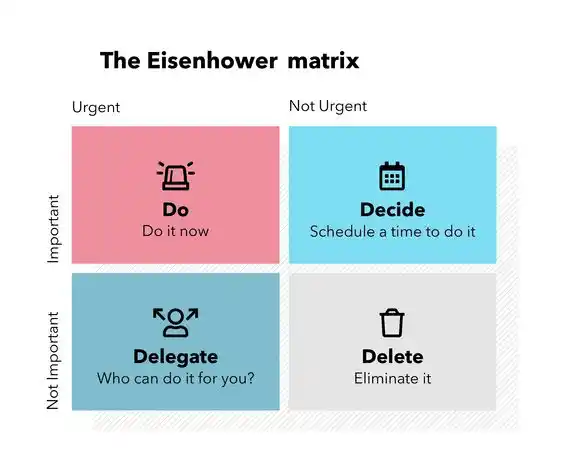Zeeshan Hayat and Karina Hayat on Deliberate Task Prioritization for Enhanced Productivity

The satisfaction of checking off tasks on a to-do list is something we all appreciate, but the frustration of endless lists can be overwhelming. Zeeshan and Karina Hayat believe that the secret to managing this challenge lies in deliberate prioritization. Yes, it often means saying no to tasks you’d rather do, but it also ensures that the most important work gets done—especially when everything feels equally crucial.
The goal is to focus on just one task at a time, and I’ve found that with the right techniques, you’ll be able to plow through your list. Here’s how to prioritise ruthlessly and get more done.
1. Collect All Your Tasks in One Place
Tasks have a way of creeping in from everywhere: an email from your boss, a Slack message from a coworker, a project note, or even a sticky note you scribbled at lunch. Before you can begin prioritising, you need a single list that contains all these to-dos.
Your source of truth can be anything—a to-do list app, a physical notebook, even a spreadsheet—just make sure everything goes there. If you use digital tools, apps like Clickup, Asana can help automate the flow of tasks from different sources into your master list. This way, you’re not wasting energy hunting for tasks scattered across platforms.
Once everything is consolidated, it’s time to break down your list.
2. Sort and Analyse Your List
Now that you’ve gathered all your tasks, it’s time to evaluate each one. For every task, you have four options:
- Do: If it can be completed in under two minutes, just do it now and remove it from the list.
- Defer: If the task isn’t urgent, but still important, schedule it for later.
- Delegate: Pass the task on to someone else if possible.
- Delete: If a task isn’t important or impactful, don’t be afraid to remove it altogether.
The goal is to reduce the number of tasks you need to focus on immediately. Delegating and deleting tasks frees up mental space, allowing you to zero in on what really matters. Tasks that remain on your list after this process are your core responsibilities—what you should focus on next.
3. Prioritization Techniques to Get Started
With a refined list, it’s time to apply a prioritization strategy that works for you. Here are some methods that Zeeshan and Karina Hayat suggest:
a. The Priority Matrix (Covey’s Quadrants) If you’re a visual thinker, Covey’s priority matrix can help. Tasks are divided into four categories based on their urgency and importance:
- Urgent and Important: Do these first.
- Not Urgent but Important: Focus on these once the urgent tasks are done—this is where long-term growth happens.
- Urgent but Not Important: If possible, delegate these.
- Not Urgent and Not Important: Delete these or leave them for later.
This method helps you focus on what truly needs your attention, rather than getting caught up in the day’s chaos.
b. Relative Prioritization Once you’ve identified the high-priority tasks, it can be useful to rank them. Let’s say you have five tasks—assign each a number from 1 to 5, with 1 being the most important. This forces you to critically evaluate the impact and deadline of each task, helping you to focus on the most pressing one first.
For example:
- Submit an urgent report due today.
- Prep for tomorrow’s meeting.
- Follow up with a client for a project next week.
Relative prioritisation helps you create a clear order, especially when multiple high-impact tasks demand your attention at once.
c. Daily Task Lists For people managing a constant stream of new tasks, it’s effective to make a daily list. Each morning, identify the most critical tasks you’ll focus on for that day. This method stops you from getting overwhelmed and gives you a fresh focus every morning. Be realistic about what you can accomplish given your schedule and focus only on that.
Pro tip: Include meetings and appointments in your daily plan so you can manage your day holistically.
4. Focus on the Most Important Tasks (MITs)
An alternative to the daily list is choosing just three MITs (Most Important Tasks). These are the top three things you must get done today. Once your MITs are done, anything else is a bonus. By limiting your daily must-dos to just a few, you ensure that your energy goes into work that really matters, rather than spreading yourself too thin.
5. Go All-In on One Task
When faced with overwhelming priorities, Zeeshan and Karina Hayat suggest concentrating on a single task. Whether it’s a big project or a recurring responsibility (like driving sales), making this the central theme of your day can sharpen your focus and boost productivity.
In moments when distractions creep in, remind yourself of that single priority. Tools like Momentum (a Chrome extension) can keep you on track by displaying your daily focus each time you open a new tab.
6. Identify Your 20% Task
The Pareto principle (80/20 rule) suggests that 80% of results come from 20% of effort. Identify that 20% of work that yields the most value. What’s the one task that, if completed today, would make the most difference?
By honing in on this task, you can make a huge dent in your to-do list. Whether it’s writing a report, completing a high-value project, or solving a complex problem, finishing your 20% task can make the rest of your list easier to manage.
Deliberate Prioritization is Key
Ruthless prioritization doesn’t mean you’ll do everything—it means you’ll get the right things done. Over time, you’ll get better at knowing what matters most and developing the discipline to cut out distractions. As your prioritisation skills improve, Zeeshan and Karina Hayat note that you’ll become not only more productive but also experience greater clarity and reduced stress.
By applying these techniques, you’ll find that prioritizing becomes second nature—and you’ll gain the satisfaction of consistently checking off meaningful tasks every day.
How do you prioritize tasks to enhance your productivity?
